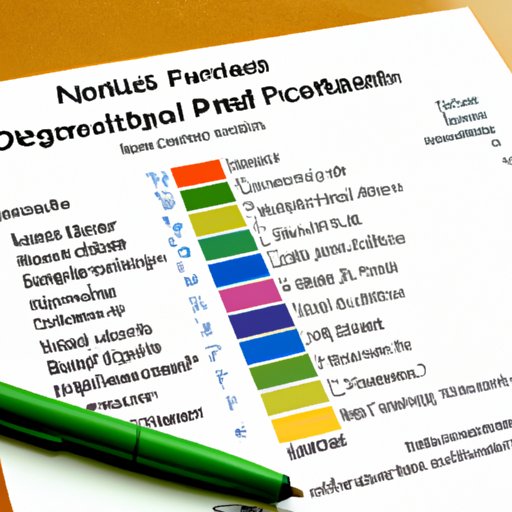Introduction
Nutrition is the science of understanding how food and drink nourish the body. It involves studying the components of food, how the body uses those components, and the relationship between diet, health and disease. Eating a balanced diet is essential for good health, providing our bodies with the energy, essential nutrients, and hydration it needs to function properly. By understanding the nutritional benefits of healthy eating, we can make informed decisions about our diet and lifestyle.
Analyzing the Nutritional Benefits of Different Foods
Different foods contain varying amounts of macronutrients (carbohydrates, proteins, and fats) and micronutrients (vitamins and minerals). Macronutrients provide energy, while micronutrients are necessary for many bodily functions, such as maintaining a healthy immune system. Additionally, dietary fiber is important for digestion and preventing constipation.
Carbohydrates are the most important source of energy for the body, and should make up the largest proportion of a person’s daily calorie intake. Foods high in carbohydrates include grains, fruits, vegetables, legumes, and dairy products. Proteins are essential for growth and repair, and are found in many animal and plant-based foods, including meat, eggs, beans, nuts, and dairy. Fats provide energy and help the body absorb certain vitamins, and are found in oils, butter, nuts, and fatty fish.
Micronutrients are not a source of energy, but they are necessary for proper functioning of the body. Vitamins can be divided into two categories: fat-soluble (A, D, E, and K) and water-soluble (B and C). Minerals are divided into two categories: major minerals (calcium, phosphorus, potassium, sulfur, sodium, chloride, and magnesium) and trace minerals (iron, zinc, iodine, fluoride, and selenium). All of these micronutrients can be obtained from a balanced diet that includes fruits, vegetables, lean meats, whole grains, and dairy products. Dietary fiber is an important component of a healthy diet, and can be found in many plant-based foods, including fruits, vegetables, legumes, and grains.
Exploring the Relationship Between Nutrition and Health
Good nutrition is essential for maintaining health, and research has shown that there is a strong link between diet and chronic diseases. Eating a balanced diet can reduce the risk of developing conditions such as heart disease, stroke, type 2 diabetes, and certain types of cancer. A healthy diet is also important for mental health, and can help reduce the risk of depression and anxiety.

Examining the Role of Diet in Disease Prevention
Eating a healthy diet can help lower the risk of developing chronic diseases. Limiting risk factors such as saturated fats, trans fats, cholesterol, added sugars, and salt can help reduce the risk of cardiovascular disease and stroke. Additionally, promoting protective factors such as fruits, vegetables, whole grains, and omega-3 fatty acids can help reduce the risk of developing diabetes, heart disease, and certain types of cancer.

Investigating the Impact of Nutrient Deficiencies on Health
Nutrient deficiencies can have serious health consequences. Common nutrient deficiencies include iron, vitamin D, calcium, and folate. Iron deficiency is the most common nutrient deficiency worldwide, and can lead to anemia, fatigue, and impaired cognitive function. Vitamin D deficiency is associated with osteoporosis, muscle weakness, and increased risk of falls. Calcium deficiency can lead to weakened bones, and folate deficiency can cause anemia, birth defects, and cognitive impairment.

Evaluating the Nutrient Content of Popular Diets
Low-fat diets are often recommended for weight loss, but they can be lacking in essential nutrients if not properly planned. Low-carb diets are popular for weight loss, but they may be low in fiber, which is important for digestive health. The Mediterranean diet is rich in fruits, vegetables, whole grains, nuts, seeds, and healthy fats, and can help reduce the risk of chronic diseases.
Comparing Nutritional Requirements Across Various Life Stages
Nutritional requirements vary across different life stages. Infants and toddlers require more calories, protein, calcium, and certain vitamins and minerals than adults. Children and adolescents need additional nutrients to support their growing bodies, including protein, calcium, iron, and vitamins A and D. Adults need to ensure they are getting enough essential nutrients to maintain health, while elderly individuals may require additional nutrients to support age-related changes in the body.
Conclusion
In conclusion, nutrition plays an important role in maintaining good health. Eating a balanced diet can promote optimal health and reduce the risk of chronic diseases. It is important to understand the nutritional benefits of different foods, as well as the impact of nutrient deficiencies on health. Additionally, it is important to consider the nutritional needs of different life stages. By understanding the nutritional benefits of healthy eating, we can make informed decisions about our diet and lifestyle.
(Note: Is this article not meeting your expectations? Do you have knowledge or insights to share? Unlock new opportunities and expand your reach by joining our authors team. Click Registration to join us and share your expertise with our readers.)
